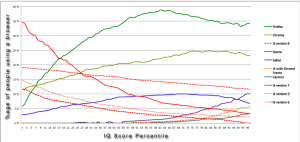Anatomy of a hoax
Last week, many newspaper websites (though apparently not any Kiwi ones) reported a study purporting to that users of Internet Explorer had lower IQs than users of other browsers, with IE version 6 users scoring 20 points lower than Firefox users, and more than 40 points lower than users of Opera. The results were supposed to be based on a survey of 100,000 people recruited through ads on websites. This turns out not to be the case.
What makes the story interesting is how many reasons there were not to believe it.
The hoax was first uncovered by readers noting that the website of the company putting out the release was (a) new and (b) copied from another company, despite the fact that the hoax press release claimed the study was a followup of one from 2006.
David Speigelhalter, who is Professor for the Public Misunderstanding of Statistics (or some such title) at Cambridge University, correctly noted The data is simply too extreme to be plausible.
A psychologist who knew about IQ testing would have pointed out that the test they claimed to use is not allowed to be administered online.
I have a new and different reason: 
The graph at the right is from the press release. It claims to show proportions for each browser over the range of IQ: more precisely, that people were divided in 100 bins based on IQ, with 1000 ending up in each bin, and the line shows the percentage for each browser in each bin. This can’t be right, because the lines are too smooth. If each point was a proportion of 1000 people, the sampling error in each point would be more than 1%, and the average ‘wiggle’ between two adjacent points would be 2-3%
It’s surprisingly difficult to fake detailed data summaries convincingly.
Thomas Lumley (@tslumley) is Professor of Biostatistics at the University of Auckland. His research interests include semiparametric models, survey sampling, statistical computing, foundations of statistics, and whatever methodological problems his medical collaborators come up with. He also blogs at Biased and Inefficient See all posts by Thomas Lumley »